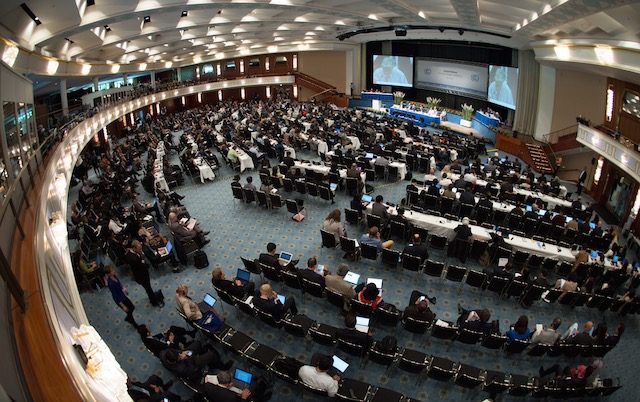SUMMARY
This is AI generated summarization, which may have errors. For context, always refer to the full article.

BONN, Germany (UPDATED) – UN talks ground to a close in Bonn Thursday, June 11, having made little headway in crafting a world climate pact but with a new tactic for pushing the process over the December finish line.
After 11 days of technical wrangling by negotiators, the co-chairmen of the 195-nation parlay said they had been asked to take matters in hand.
In the coming months, they will seek to condense a sprawling blueprint into manageable options ahead of the November 30-December 11 conference in Paris where the carbon-curbing deal is due to be sealed.
“You will have by the end of October the draft package,” co-chairman Ahmed Djoghlaf of Algeria told journalists, referring to a core political agreement backed by a set of technical decisions for implementing it.
The co-chairmen have proposed a July 24 deadline for submitting the whittled-down offering.
The Paris accord is meant to save future generations from disastrous climate change.
The draft of the agreement coalesces around limiting global warming to 2ºC (3.6ºF) over pre-Industrial Revolution levels.
That figure, scientists say, offers a good chance of avoiding climate damage that would inflict ever-worsening drought, flood, storms and rising seas.
Taking effect from 2020, the accord will be enacted by voluntary national pledges to curb greenhouse gases – the emissions, mainly from fossil fuels, that are driving the warming phenomenon.
But the voluminous draft text is laden with wide and politically explosive differences.
They include opposing country views on how to review and hike pledges to ensure the 2ºC target is on track.
Just as unclear is how rich countries will meet a promise to muster $100 billion (88 billion euros) annually in climate aid by 2020.
The thorniest issues will ultimately be left to ministers or government leaders to settle.
But veterans of the 23-year climate process say politicians must be able to work from an uncluttered draft text.
In Bonn, negotiators trimmed a near 90-page blueprint by about 10%.
“We still need to do 30, 40% more in terms of slimming,” said Amjad Abdulla of the Maldives, and chief negotiator for the Alliance of Small Island States.
“For me it’s still difficult to go and sit with my minister and explain” the contents, he told Agence France-Presse.
Another criticism of the mid-year talks is that there were no negotiations on the actual sticking points.
“Negotiations on substance are still lagging behind. It’s clear that we can’t continue this pace of technical negotiations,” said Elina Bardram, head of the European Union delegation.
“It’s really, really going to be necessary that the next meeting in August makes substantial progress… otherwise we will have problems going to Paris.”
A dozen or so international meetings are taking place in the coming months, where ministers or heads of state and government can help to break the logjam.
‘Trust, trust and trust’
Many cautioned against predictions of doom.
The Bonn talks may have under-achieved and time may be short, but goodwill – the vital lubricant for a deal – remains strong, they said.
“We should not be frustrated and disappointed,” said French negotiator Laurence Tubiana, whose country will host the December conference.
“The first condition is ownership of the process. Everyone must feel comfortable at every step… we achieved that here.”
There were three conditions for success, she added: “The first one is trust, the second one is trust and the third one is trust.”
Negotiations in the UN Framework Convention on Climate Change (UNFCCC) carry the scars of a near-bustup at the 2009 summit in Copenhagen – the last time the world community strove to forge a climate treaty.
Since then, the focus has been on consensus rather than confrontation, although scientists and observers fear the outcome may be too timid.
“Governments are still negotiating at a snail’s pace on the way to a new agreement in Paris, and moving too slow to achieve a fair and ambitious landmark deal,” said Sven Harmeling of CARE International.
“In the next 6 months, governments must really pick up the pace.” – Mariette Le Roux and Richard Ingham, AFP / Rappler.com
Add a comment
How does this make you feel?
There are no comments yet. Add your comment to start the conversation.